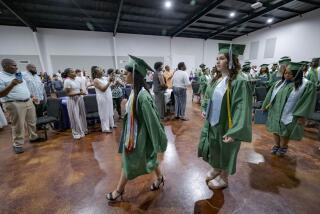Bureaucracy’s Hard Lessons for Home Schooling
- Share via
One of the most important things to know about dealing with a bureaucracy is that sometimes you have to show up in person. A voice on the other end of the phone is easy to brush off. A person standing in front of you is hard to ignore.
So after half a dozen frustrating calls to our local community college, where I hoped to enroll my home-schooled teenage daughter for a couple of classes, I went to the admissions office.
Alas, there I meet the same clueless response: My daughter can enroll at the community college only if she has permission from her school district.
But she’s home-schooled, I say. She has no district. Everyone has a district, I am told. Who else could tell you how to teach?
It is with words like these that revolutions are quietly defeated, consumed and co-opted by the status quo. I simply want my daughter to take introductory psych and American history.
The home-schooling movement challenged the idea that compulsory education by the state was necessary; it allowed parents the freedom to educate their children, and many kinds of families took advantage of this new power. Some found public schools too liberal and secular; others found those same schools too conservative. Many found that the schools didn’t meet their academic goals. All these parents decided to choose how their children should be educated in a quiet and small-scale -- but still radical -- movement.
But now home schooling is becoming ensnared by the same educational conventions that should be anathema to it. Home schooling, my community college admissions office tells me, is what you do at school.
Yes, I acknowledge, many school districts now present ready-made lesson plans to parents who wish to home-school but want help in choosing materials and gauging progress. I don’t mention my deep suspicions that corralling state attendance money is the real motive behind these offers.
But these watered-down forms of home schooling should not be mistaken for the real thing. If I thought that the public schools could educate my daughter, I would have enrolled her in them. I am home-schooling her because I want to give her a broader and deeper education. One proof of which is that I am trying to enroll her in college when she is still in high school.
But where does she go to school? I mean where is her school? the admission counselor asks, unfazed.
At home, I say. Hence the term “home schooling.” But where do you get your information on classes from? the admission counselor asks.
I look at the state’s standards for each subject, examine reviews of textbooks, talk to other parents, I say. I use my own knowledge that trig comes after algebra and that semicolons are important.
But you can’t just make up a curriculum, she says. You’re just an adult.
At this distressing juncture I could point out that state schools Supt. Jack O’Connell recently relaxed a little-observed but important limitation that parents be credentialed in order to teach at home.
But I realize there’s no sense in continuing the debate.
I do not say the entire reason for home-schooling my daughter is that I want her to be intellectually curious. I do not say the reason I am home-schooling her is to make sure she has an open mind and does not become the kind of person who asks the kinds of questions this counselor is asking me. I do not say such encounters should be a warning to the home-schooling movement in California. And I do not say, “Knowledge which is acquired under compulsion obtains no hold on the mind.” I do not have to, because Plato has already said it for me.






